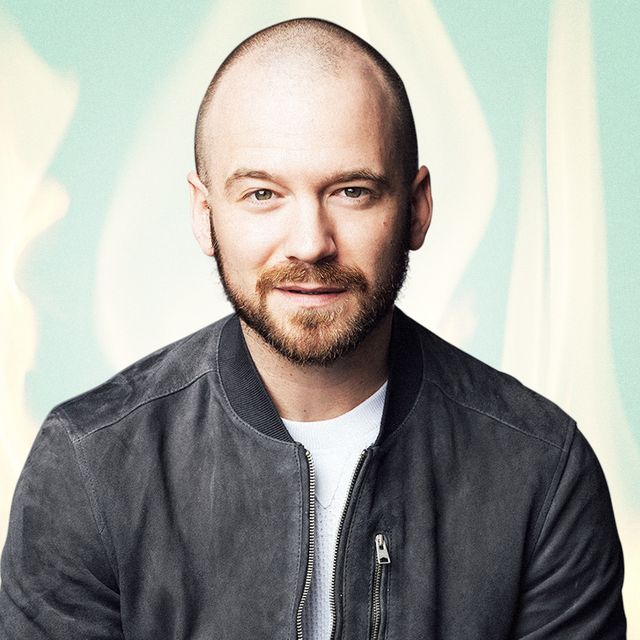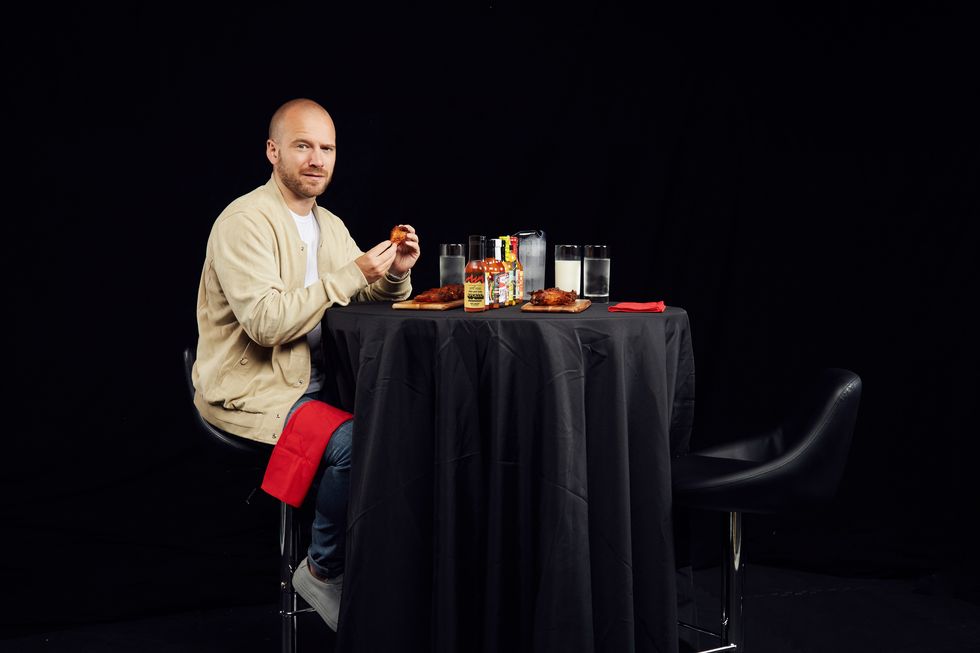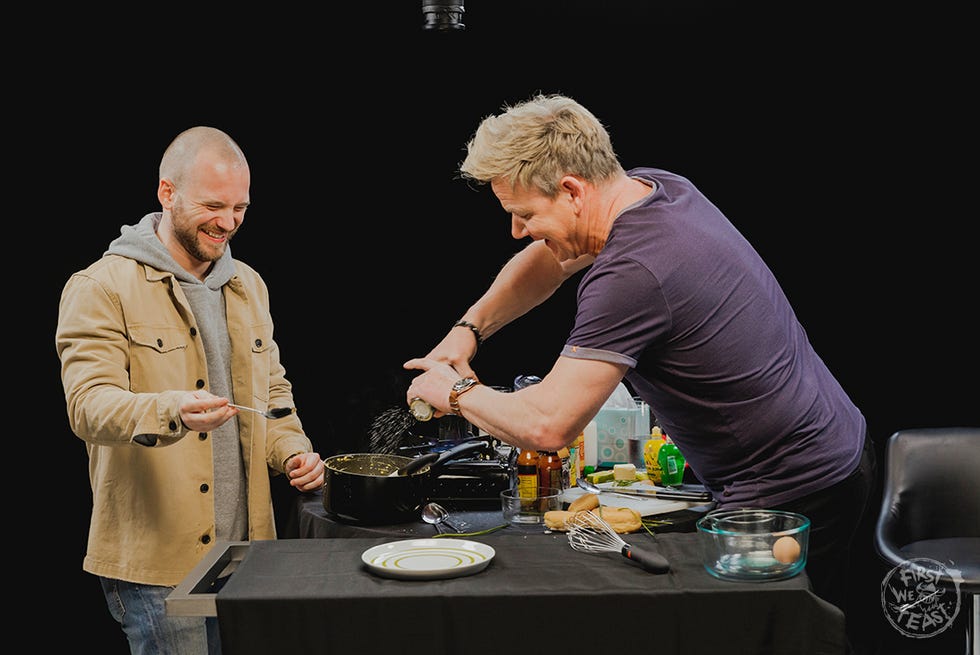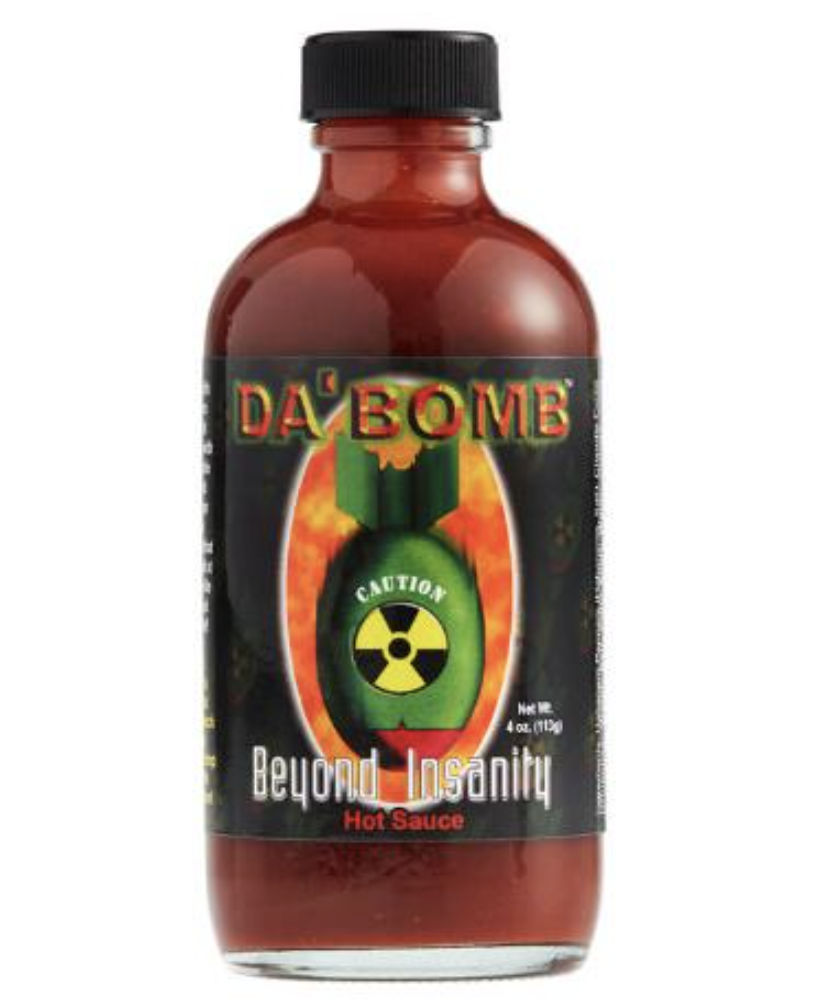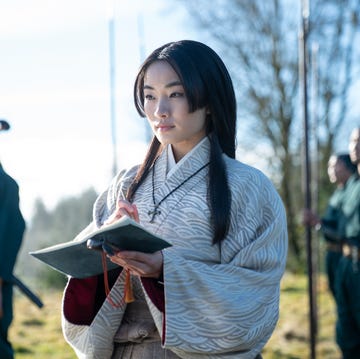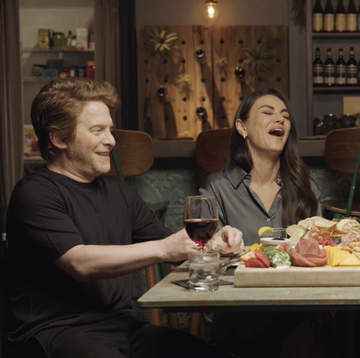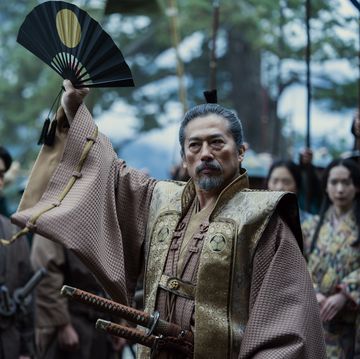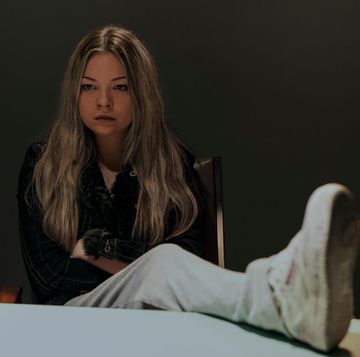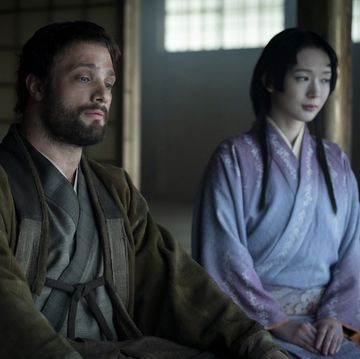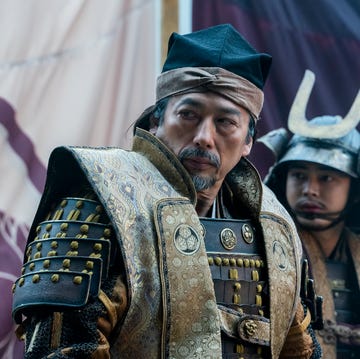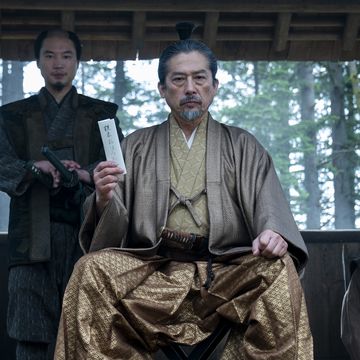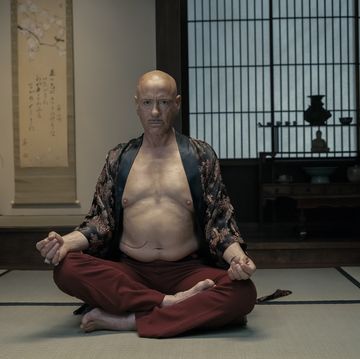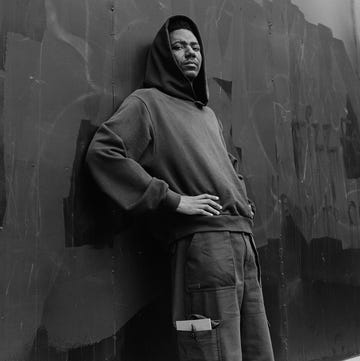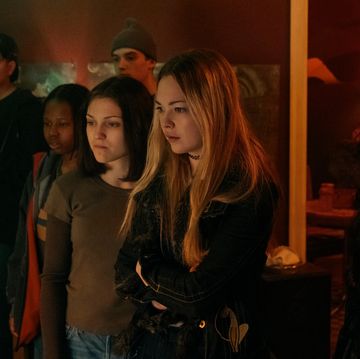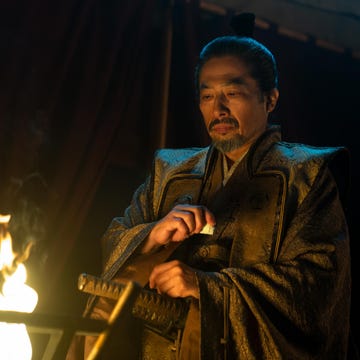Last Saturday night, Hot Ones host Sean Evans was sitting in his apartment when his phone started blowing up. He turned on the TV, and to his absolute amazement, Saturday Night Live was parodying his immensely popular YouTube interview show. He (played by Mikey Day) was interviewing Beyonce (played by host Maya Rudolph), and the two were making their way through the hottest wings, in his show's trademark style. But Beyonce couldn't handle it, and in her distress called the fake Evans a "bald bitch." That was Evans' favorite line of the sketch, he told Esquire.
“My favorite thing is that someone from wardrobe at SNL had to source a Sean Evans outfit, and Mikey Day killed it," Evans said. "I have this habit of playing the piano on the table when I'm asking questions, and to see that come through on SNL had me dying laughing. Hot Ones being immortalized in SNL history is something that's really special to me. I revere classic television, and I'll remember that forever."
After premiering in 2015, it's no surprise Hot Ones has reached SNL-parody levels of fame. The First We Feast show has built up a massive audience, and now gets at least one million views per episode. Shaq's iconic episode has 28 million. It’s a YouTube empire that has spawned a television game show, a Reebok shoe collection, and a hot sauce line, but hasn't actually changed much at all since its humble inception. After fourteen seasons and hundreds of A-List celebrity guests—from Guy Fieri to Paris Hilton—it’s perhaps the last media industry pivot to video effort still thriving. The format is simple: Evans and his famous guests eat increasingly hot wings as they answer his deeply researched questions.
Hot Ones has shown time and time again that no one, famous or otherwise, is immune to the tongue burning devastation of a supremely spicy hot sauce. Eating spicy wings makes you vulnerable and real, which along with Evans’ deep-cut questions, has proven to be the ticket to making what is one of the most engaging, hilarious, and smart celebrity interview shows of all time. Esquire talked to Sean Evans about the silver linings of remote interviews throughout the pandemic, the worst hot sauce reactions he’s ever witnessed, and what’s next for him and Hot Ones.
How did the idea for Hot Ones initially come about?
Sean: Well, back in 2014 or whatever, there was a big push in media for everybody to pivot to video. So at the time First We Feast had won some James Beard awards, but it didn’t have much of a video product. So when we were thinking about what that would look like, me and Chris Schonberger, who runs First We Feast, were thinking celebrity interview shows are boring. How do we make them not boring? So we were just really trying to solve for that, disrupt, and take celebrities out of that PR driven interview pattern. And he kind of just said, "What do you think of an interview show where we have them eat violently hot chicken wings and they get progressively hotter as the interview goes along?" And then the way it hit my ear was just so funny. So, we got in a room and we got some pizza and got some beer and started mapping out exactly what that would look like. And then we shot a pilot with Tony Yayo. I think probably because just he owed us a favor, and thought it was funny like we thought it was funny. And then here we are, some five-plus years later, a couple of hundred episodes and 14 seasons, and it's all been kind of crazy, but that's how it started.
Why do you think it's been such a huge success?
Well, it’s a good hook. Just the idea of the most famous people on earth eating wings soaked in the hottest hot sauces. As a voyeur, that's just something that you kind of have to click in and watch. But I think on the other side of it, there are some unintended consequences that I'm not going to claim we were smart enough to see. But I think one of the things is that celebrity is this thing that by definition is an unobtainable lifestyle, it's aspirational, it's on a pedestal...but that is completely subverted when the person is just dying on hot sauce. Hot sauce becomes a very humanizing thing. So I think for years and years and years, everyone has tried and failed to make that show—that “what is it like to have a beer with this person” show. And I think we accidentally created it. So I think that is why it's been such a phenomenon, and then on top of that, we had this huge cult audience from the beginning. It wasn't always the most popular show, but it was the same people showing up week after week after week. And that really motivated us to really think about the interview and make the interview something that is independently excellent, wings or not. So I think all of those things have coalesced to make this show that's so comfortable, but also uncomfortable, that's humanizing, that can have these wholesome moments. I sometimes think that people watch it to learn something, to laugh a little bit, but then it also can sometimes catch you in the feels or give you a little bit of a feel-good feeling. So I think all of those things are reasons why people love and continue to watch the show.
You're known for your deep cut questions. What's that research process like and how has it evolved over the years as the show has grown?
I think we've kind of just honed it, it's always been pretty much the same. But early on, we didn't have these huge aspirations for the show, so we thought it should just be as gonzo as possible. That's what would make this thing successful, but that has an expiration date. I think if it were just people reacting to spicy wings all the time, it would get old to people pretty quick. So the research process, which is basically like, we read everything, we watch everything. We make sure that we watch the whole film catalog and read almost everything that's in print. We'll try to track down what their local papers were saying about them early on, before their careers were ever big, because those are probably people that would know them best. We try to go to the roots of everything. And now you have so much podcast material and all these interviews on YouTube, you have these back catalogs on the internet. So between me, Chris Schonberger, and then my little brother, Gavin, we kind of divide all of that up. We then create a research dossier out of all the interesting nuggets that we find. Then we kind of combine these dossiers together and we'll come up with maybe like 30 talking points that we could hit. We'll narrow that down to what we think are the most interesting 10, and then those will each be different wings. And then we'll write kind of an overarching thesis question right out the gate. And then we'll layer that with three or four follow ups, maybe we'll gamify something. In the last episode with Anthony Mackie, we did like a who dat or not dat, because he's from New Orleans. So we were hitting him with New Orleans cuisine, sort of like, do you do this? Dos and don'ts. We'll find ways that we can make things a little bit more interesting. And that's kind of how the run of the show comes together.
Are there certain celebrities that you feel like you have a crazy encyclopedic knowledge of now that you've gone through that process with them?
Yeah, actually I think one of the reasons too that the show has lasted so long is that each episode ends up being an extension of that guest's personality, because every celebrity is a unique entertainer. So it's a different viewer experience every single time. I used to do architecture tours of the Chicago River and there are times where I'd have dreams where I would fully do a whole shift. I'd just be doing three tours in my dream, it's still banged into my brain. And I could probably from memory just give out the bio of the hundreds of people that we've talked to on the show over the years. So, yeah. I've never really thought about it, but yeah, it does give me a kind of unique perspective into these people's worlds and lives.
What's the worst hot sauce reaction that you've ever witnessed?
There's been so many, so many, but Da Bomb is a sauce that we've kept in the lineup forever and ever mostly because the reactions have always been so crazy. But when I think back, Pete Davidson did the show and he has Crohn's disease, so that whole thing was just a wing by wing meltdown and testament to his fighting spirit and being down to do it. We've had people bail out of the studio and need to take a break. Eddie Huang famously started from the hottest wing. So we only got like two wings in and he's basically down for the count and getting aired off offstage, getting a towel, and taking laps around the office. We had Coolio pass out in the green room for hours after his interview. They've all kind of blended into one long, crazy spice dream in my head. But yeah, a lot of crazy, a lot of face sweats. The thing that I worry about most is people touching their eyes and getting that cross pollination. But it’s so many they all kind of just blur together.
My favorite is Aubrey Plaza, when she snorted the milk.
It's funny because you do this show so many times, but then everybody has such a different approach. Yeah, Aubrey snorting the milk. Nobody had ever snorted the milk before. You also had Gordon Ramsay bring a whole Mary Poppins bag of antidotes for himself. Everybody has a different strategy for how they approach it. And the fact that I see something new almost every time keeps it interesting.
What's your experience being a creator and celebrity in the YouTube food world?
Well, it's interesting because you become very accessible when you're on YouTube, and so recognizable because it's everywhere. So it doesn't matter where I go or what country I'm in, people will yell, "Hot Ones" at me on the street. So that's been super interesting. And then I think also, people really feel connected to you. I think that that's a different thing that happens on YouTube that doesn't happen maybe on TV or in movies—on YouTube people really feel like they discovered you, so they feel like they’re a part of it. And there's the sort of town hall discussion that happens every week in the comments and you see some of the same people interacting all of the time. So I think that there's a sense of ownership that comes with that for the fans. They really feel like they're a part of your wave, a part of your ride. And then it is cool to see that in real life people feel like they know you and really feel like they have a connection to the show. That's special, and that's something that I've been very grateful for.
I was going to ask if you read the comments.
I mean, I've been on the internet now for five plus years doing the show and when you've been doing it for that long, you do have to find a healthier way to consume that sort of thing. The more successful things get, the weirder things get. Back in the day, it was really interesting to get that kind of fan feedback. But then once you reach a level of success where it breaks containment ... If I looked at my Instagram messages right now, I don't look at those because if I did, it would just be a bunch of kids asking me to buy them a PS5 or something. It breaks containment and gets a little bit weirder and you don't want to be in that loop where you're reading the good and thinking you're so good and then reading the bad and then thinking you're terrible and feeling bad about yourself. So to me, on YouTube, I kind of see the stuff that gets upvoted to the top. Like once the video's been up for a couple hours, I'll check to see what the vibe is. But I don't look at Instagram or Twitter and even the message boards or really get into the weeds of the comments. I'm peripherally aware of what's going on on a top-line level, but I don't get deep in that anymore. I learned that lesson.
Who are the celebrity interviewers and YouTubers that inspire you?
Growing up, I had heroes in Howard Stern and Jimmy Kimmel, in David Letterman, Adam Corolla. I think nowadays, if I look in the internet space, Nardwuar was a huge inspiration. I remember watching his videos when I was in college and just running back these super human moments when he would connect with certain people. I’d play them over and over. I take it as a huge compliment when fans tell me that they do the same thing with me, because I remember what that feeling was like. TV and entertainment were such a huge part of my upbringing and the way I'd pace out my week was based on shows, whether it was TGIF on Fridays or South Park on Wednesdays or watching music videos in the morning. And all of those things really did a lot for me as someone who was a little bit of a latchkey kid growing up. So I just kind of try to give that same feeling back. In terms of podcasts, I think of N.O.R.E. with Drink Champs, Joe Budden and all that he has done to create his own lane in the podcast space. Terry Gross, her batting average is outrageous. She never breaks an interview. And then, it's interesting to see the way dynamics have shifted, where maybe you look at somebody like Joe Rogan as being as close to anything like Howard Stern in the '80s or the '90s. So there are a lot of people who inspire me, not only because of the interviews that they do but also the roads to success that they've created for themselves.
You've become a hot sauce expert and connoisseur over the years. Tell me a little bit about that community and what it's like for you.
That's been one of the most amazing things. People ask me all the time like, "Oh, I'm in Seattle, where's the best wing spot?" And I'm always like, "Dude, I'm not eating wings in my off time." I don't know everything about wings, like where the best wings are. I'm not ordering wings at a Super Bowl party or getting wings when I go to a restaurant. But hot sauce on the other hand is something that I've become a lot more interested in. The subculture is super interesting. All these craft makers we've worked with over the years, they all have super interesting stories. And just being exposed to hot sauce, I've really been educated about the ways that it can pair with meals and make everything so much better. I've got a whole ... My buddies always laugh when they come over to my apartment, but I have this whole cabinet that is just filled with hot sauce. There’s been an amazing opportunity to create our own stuff because we've basically taken hot sauce and made it this shooting star in the constellation of pop culture. And I think we have really increased awareness and enthusiasm particularly around these small craft makers. And then to be able to take the success of the show and leverage that to work with some of the best makers to make hot sauces that we really love and put them on the show and that our fans are into—all of that has been amazing. I really think that hot sauce is having a moment that craft beer had years ago where now people are interested in all these makers. Even if they're not interested in the sauce, the labels and the names and the branding is so interesting that a lot of people just like having these unique bottles from all over the world, just putting them on the shelf as a collector's item. So the education that I've gotten doing a cannonball jump into the world of hot sauce has been a really rewarding and amazing experience.
What is the weirdest thing that you put hot sauce on?
Hm. Ice cream. There are ways to pair hot sauce and ice cream that work. That's been a weird one that I've done. The gnarliest thing I've ever eaten was a Carolina Reaper, which I've done on two occasions and that's not putting it on anything, but just taking it straight up. That's definitely one of the weirder things that you can do with your day, but hot sauce on ice cream, hot sauce in cocktails, works.
You did a TV game show, too. How did doing that compare to what you do on YouTube and what was filming it like?
It's a completely different thing altogether. It's funny because on Hot Ones, you have eight people working on it. And then in the game show, it's so much bigger. When you make stuff on the internet, the creative control that you have over it, every creative decision kind of comes down to two or three people, but it's just a much faster and truer creative process. And then your ability to turn things around faster is so much better on the internet, and to do something that is all you. I think when you do something on TV, there's that cliche about cooks in the kitchen and that's definitely true. You have different people, whether it's the production company, the network, us, there are so many cooks that are coming together and then the power struggle...You can really feel it in a way that you don't on the internet. So in that way it was definitely a learning experience and much more challenging. But I think what was great about the game show is that you can't make a big game show on YouTube. It just doesn't make sense. So I think that's kind of nice about now that you have all these different platforms, all of these different homes, where if you have an idea, there are different places that you can put it. You can find the best possible home for it.
Overall there was a lot about working on TV that made me realize I prefer the internet way of creating. But at the same time, I think a good thing about being out of the feedback loop of the internet was a positive part about being on TV. Doing something with the fans actually present was an amazing experience because on the internet, you see the numbers, you see the comments, you know people are watching it, but you don't actually feel it in a face-to-face way. So stepping into the Pepper Dome and seeing the place packed with Hot Ones fans and people throwing me hot sauce bottles to sign and all of that stuff was amazing. The contestants that we had on the show, meeting them, hearing their stories, that was super touching and rewarding in a lot of ways. I'm happy I got the experience so that I could learn the things that I’d do differently the next time.
Hot Ones recently released a Reebok collaboration. How involved were you in that design process and what was seeing those on the NBA court like for you?
That was such a thrill. It was just one of those things where people just started texting me. They're like, "I think Josh Richardson is wearing the Hot Ones collab." And then I just turned on the TV. And you can just see the way that they pop on court. They were popping in such a way that I just grabbed my phone and started recording my TV and sending it to group chats with my friends. It felt like such an amazing breakthrough. There are ways that Hot Ones has broken containment and created pop culture moments, whether it's like the Paul Rudd, "Look at us. Who would have thought? Not me," that almost got bigger than Hot Ones itself. Or the Shaq face and meme. But to actually physically see these things come alive, it's such a rewarding and crazy experience.
And as far as the design process, you want to make sure that everything ties into the show, so Reebok really did take the lead and did an amazing job. But what was important for us, was that it had these details that all tie into the show. So there was the box with the wings and the milk on it, and the Scoville scale on the tongue. We wanted to make sure that they would tell a story. You have a shoe that represents the 10 wings. You have the Legacy shoe, that's like a refreshment, it has water and splashes of milk on the side. And then you have shoes like the Shaqnosis or the Question that are just so turned up, they're so hot sauce. The Questions are hot sauce red, they have a dab of the last dab on the back of them, and the Shaqnosis, they're so obnoxious in the best way possible, just very much like his episode, high-octane. So what was important for us is that you had a little story and a connection between all of the shoes, but Reebok just knocked it out of the park with the design.
You've said before that one funny byproduct of remote Hot Ones has been watching guests dump crazy amounts of hot sauce on their wings since they're just doing it themselves at home. Have there been any other silver linings in Zoom filming?
I think the other side is...you lose a little bit in the face-to-face connection and rhythm that you have with an in-person interview, a sort of personal connection that I think is integral to an interview. But on the other side of it, with our show being the show where you have scorching hot chicken wings, and especially in these remote episodes where people are dumping sauce all over their wings, there also is a comfort in these people being in their own homes. So when you're doing that kind of a challenge, there is a relaxed comfort that I've seen in the home environment. And I think even for viewers, it's been interesting to go into all these different people's homes. You saw The Undertaker, for example, he has this Headbangers mansion that is exactly how you'd expect The Undertaker to live. Obviously it's not the same show. It can't be the same show and you lose your ability to quality control the wings, as well as the audio and the visual. But in these times, it's a do your best and take what you can get situation. The show must go on, and this'll be a part of our history, and one that I will look back on fondly. I think that Hot Ones during quarantine does look and feel more like Hot Ones than the late night shows look and feel like late night shows. So in that way I'm proud of it, but I cannot wait until we can go back to operating like usual and traveling around and doing the show that people have come to know and love.
What's next for you and Hot Ones?
It's interesting, because I do feel in some ways closer to the end of it than the beginning. We have been doing it for a long time and I'm not sure there's anything that I'm leaving on the table. Hot Ones has already done 10 laps around any expectation that I ever had for it. So where I'm at now is we've created this small team of people that have been with the show since the beginning. I love everybody that I work with. I love the process of creating the show on YouTube and I love being on the internet to do the show. So it's in a spot where I'm just doing something that I really enjoy doing. So I'm committed to Hot Ones for as long as the fans will allow it. As long as I'm welcomed to do this show, I'm going to do this show just because I absolutely love it. I love the process of the research, I love the interview, I love the people. Nothing about it has gotten tedious for me, even the idea of eating these 10 scorching hot chicken wings every week. It's something that is just a part of my life and has shaped me so much over the last five years that I have trouble looking beyond it, or looking around the corner for what's next. And especially too, after having experiences working outside of it, I think that if I left Hot Ones I'd be left trying to capture that lightning in a bottle that I have now, or trying to restaff and put together a team that is already doing exactly what we're doing right now.
So for me, I'm in a comfortable spot. I'm hoping that there's this sort of rebound excitement when we return to the studio and that the show can catch the rhythm that it had going from, I'd say like the Gordon Ramsay episode to the Justin Timberlake episode. I'm just so proud of that stretch and that body of work. And it does feel like the pandemic kind of pulled the rug out from under us. So I want to get back on the road, get back to doing that thing, just sort of lighting up the internet every week. And that's something that I can be happy with and committed to for quite some time. So we'll see how it all goes and how it all plays out. There are things that are outside of my power, but I'm just going to just keep doing this job that I love for as long as people will allow me to do it.
